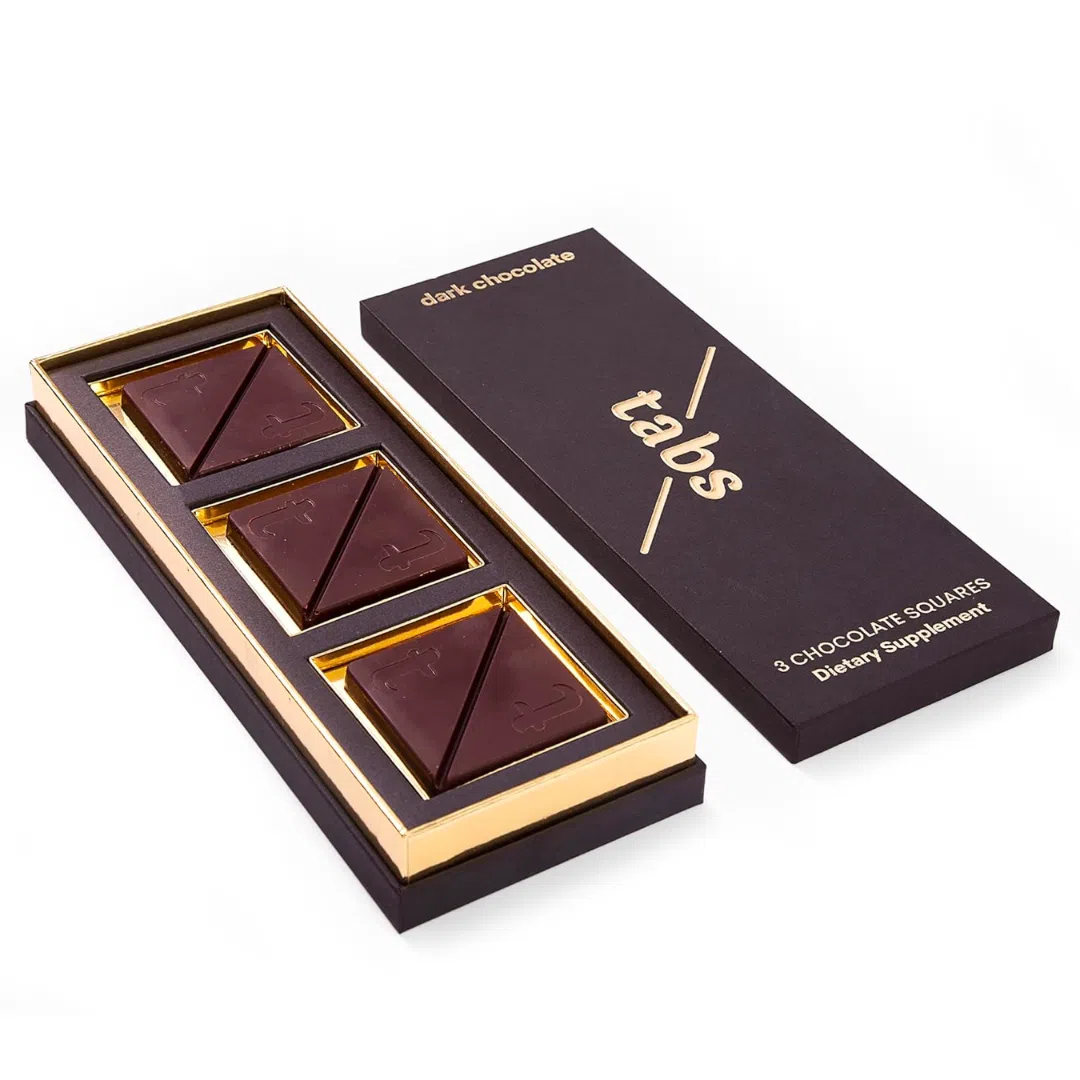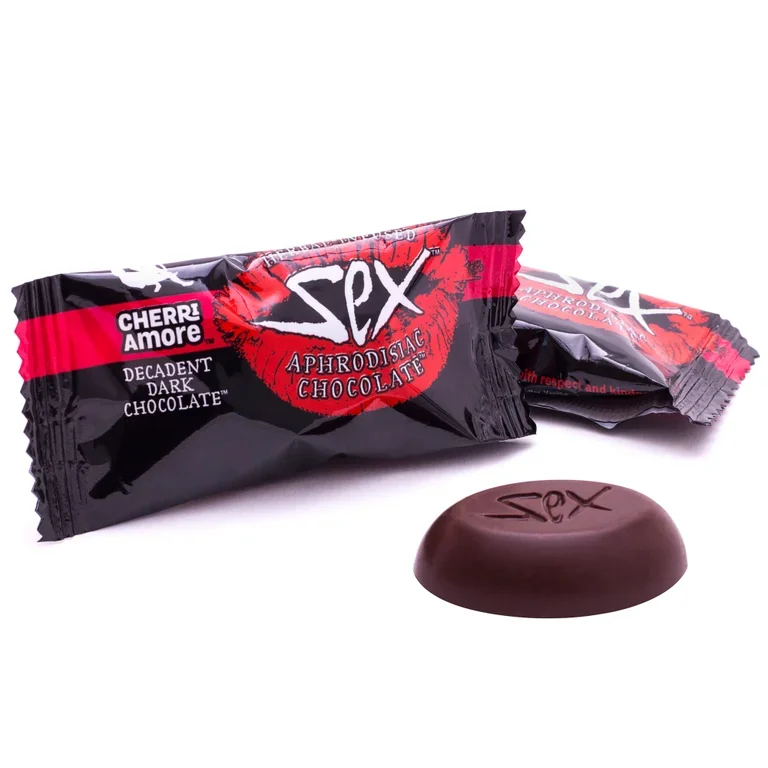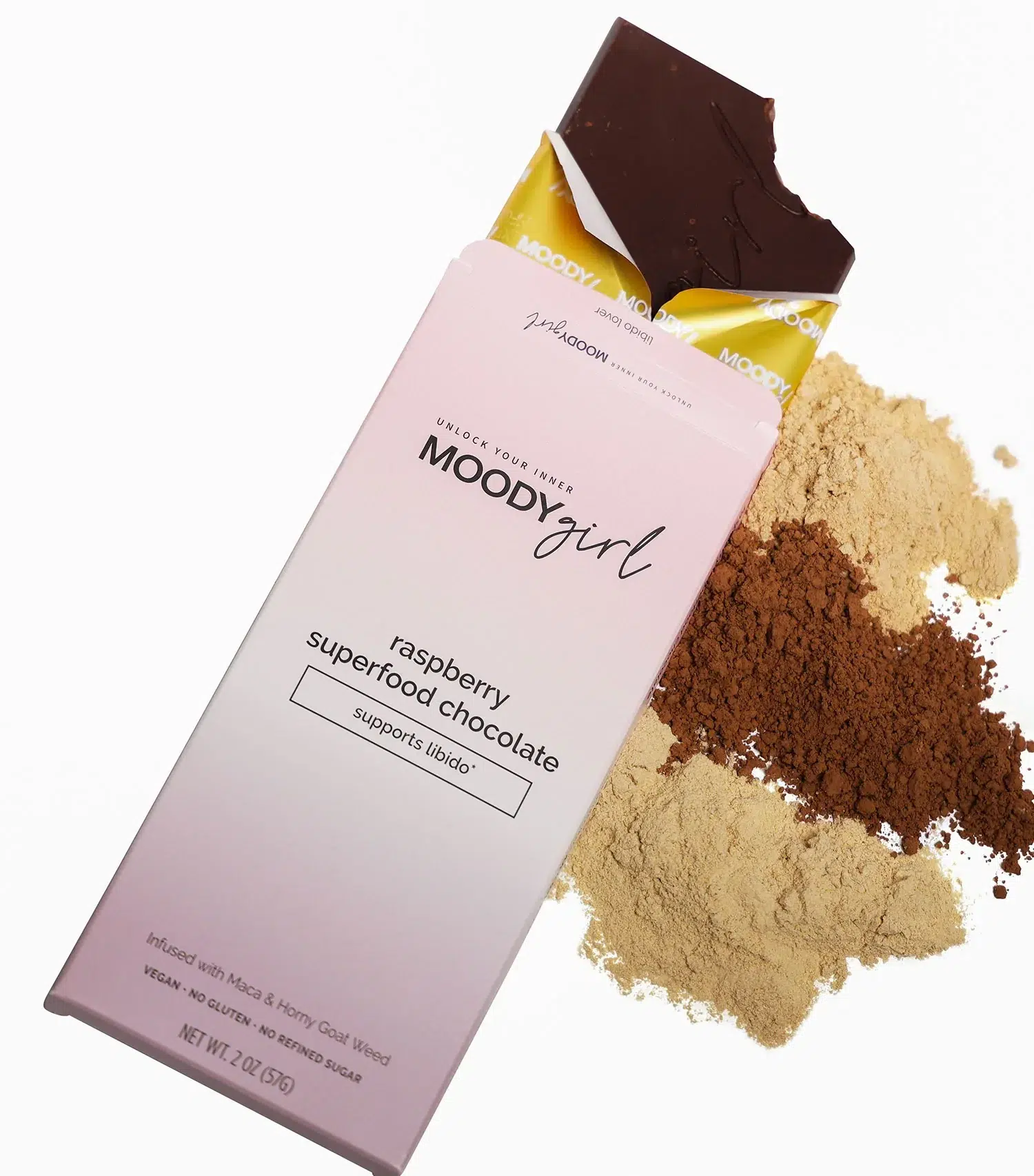If I tell you there’s a particular variety of chocolate that has the potential to
- Enhance your sex drive
- Help you with erectile dysfunction
- Make you and your partner incredibly horny
you are two keys away from dialing the FBI because you think some random dude on the internet is trying to scam you.
But hear me out for a second… Supplements like these already exist and are PROVEN to be effective since they use something called natural aphrodisiacs.
Now, here is the kicker – some companies take these supplements and instead of a boring pill, they blend all the ingredients into sexy chocolate bars.
That’s why I made this epic guide on the best libido chocolate bars that ACTUALLY work.
This article is evaluated using our Supplement Scoring System, Version 1.0.
| Rating Factor | Explanation |
|---|---|
| Taste | We check if the supplement tastes good and matches its described flavor, ensuring a pleasant use without artificial aftertastes. |
| Effectiveness | We verify the supplement’s health claims by examining its ingredients and consulting scientific studies, ensuring promised results. |
| Brand Reputation | We evaluate the brand’s market standing by reviewing customer feedback, the quality of support, and any accolades, focusing on reliability and trust. |
| Value for Money | We assess whether the supplement’s quality and effectiveness justify its price, considering serving size and cost per serving for overall worth. |
To learn more how we rate supplements and how we select the best supplements, explore our detailed explanation guide by clicking the link.
What is Sex Chocolate?
Sex chocolate (or libido chocolate) is a special kind of treat designed to increase sexual pleasure. It’s chocolate that’s been mixed with aphrodisiacs known to boost arousal and sex drive. These sex chocolates often include herbs and supplements believed to enhance sexual desire and arousal, making them a great companion for romantic evenings.
Read Full Guide >>> Sex Chocolate Explained.
The Best Sex Chocolates of 2024
- Tabs Chocolate – Best Sex Chocolate
- Sextz – Best Sex chocolate for ED
- Sexy Chocolate – Best Sex chocolate Flavor
- MoodyGirl – Best Affordable Chocolate
Comparison of The Best Sex Chocolates
Ranking | 1st | 2nd | 3th | 4nd |
Rating | 4.8/5.0 Best Sex Chocolates | 4.7/5.0 Best Sex
Chocolate for ED | 4.5/5.0 Best Sex Chocolate Flavor | 4.5/5.0 Best Affordable |
Price For one Chocolate Bar | $29.99 | $24.95 | $7.89 | $4.00 |
Sessions per Chocolate Bar | 3 | 2 | 1 | 2 |
Duration Before Effects | 60 minutes | 60 minutes | 60 minutes | 45 minutes |
Increases Sexual Desire | ||||
Increases Blood Flow | ||||
Vegan | ||||
Flavor(s) | Dark Chocolate Pink Cherry | Amorous Amaretto Cherry Amore Midnight Mint Raspberry Romance Salted Caramelicious | Champagne & Berry | Rasperberry |
Read Review |
A closer Look At The Best Sex Chocolates
Still her? Good! In this section I am going to tell you more about each individual sex chocolate I mentioned 4.21 seconds ago.
#1 Tabs Chocolate – Best Sex Chocolates

Tested With Scoring System 1.0
TASTE
EFFECTIVENESS
BRAND REPUTATION
VALUE FOR MONEY
I am kicking off this product roundup with the legendary Tabs chocolate.
You: What do you mean with legendary Sean?
Come on dude, you are kidding me right??
I am 100% sure you've seen on of those viral TikTok video's on the internet where couples buy one of their bars and have some sexy sexy time.
Anyways, let's move on to whether this stuff actually works or not.
@thechocolatez Fun date idea for the lil freaks out there #tabschocolate #freaky #libido #datenight #couple #dateidea
♬ original sound - Tabs
Taste
The make-or-break for any chocolate, libido-enhancing or not.
Now, pop a Tabs into your mouth, close your eyes, and let it melt… and.... wait for it...
To be completely honest - it just tastes like regular dark chocolate. I don't taste any of those special libido boosting ingredients (which is a very good thing).
While I am being honest with you, I also must admit that I am not a huge chocolate fanatic but even I like the deep, resonant notes of cocoa. It gives a nice smooth aftertaste as well.
Tabs Chocolate consists of 60% pure cocoa which is known to be a natural aphrodisiac. It’s also 100% natural, vegan and gluten-free.
Along with this, Tabs chocolate also includes:
Key Ingredients
- Epimedium - Boosts Libido, Initiates arousal, increases sensitivity
- Maca Root - Stimulates Blood Flow, Promotes Balance, Supports Sexual Function
- DHEA - Activates Testosterone, Enhances Performance, Activates Estrogen
Tabs Chocolate Facts
- Non-Alkalized dark chocolate
- Gluten Free
- All Natural
- Vegan
- Made in USA
Tabs Chocolate Formula
- 60 Cocoa
- Saturated Fat - 2.27g
- Total Carbohydrate 5gr
- Trans Fat - 0g
- Dietary Fiber 2%
- Cholesterol 0mg
- Total Sugars 4g
- Sodium 15mg
- Protein 1%

Effectiveness
Tabs Chocolate is backed by rigorous scientific studies, where folks like you and I had their sex drive and libido analyzed and tested.
Each ingredient didn't just pass; it soared with flying colors.
Keep in mind though that the individual ingredients are tested and passed. Not the actual chocolate.
You: That’s all great, but does it actually work?
That’s a good question.

My wife and I tried it and for the first 5-10 minutes we didn’t notice anything special but after an hour we felt super aroused and couldn’t get our hands off each other.
Of course we both knew all to well this wasn't just 'regular' dark chocolate so we were already pretty excited about it.
Which makes me wonder if part of the hype is just the anticipation (only placebos), not the actual chocolate.
Read Full Review >>> My Tabs Chocolate Experience.
Brand Reputation
Tabs is a big player in the libido chocolate world. They got tons of positive reviews even from influencers and other famous people. Of course influencers are often paid to promote stuff on the internet so not sure how objective these reviews are.
That said, Tabs did get FDA approval. Which means it's in the FDA database, verified and validated as a legit product.1
Value

1 Box of Tabs chocolate will cost you $29.99 which seems pretty expensive for dark chocolate, but I do think it is a small price to pay for having fantastic sex with you partner.
My Personal take
I’m seriously LOVING Tabs. It’s like they took everything you want from a sex-enhancing treat: it works, it’s safe, and darn, it’s tasty.
Each bite is a promise of a good time, without compromising on the flavor or safety.
Pros
- Scientifically backed ingredients enhance libido
- FDA-approved, ensuring safety and quality
- Swift and noticeable effects
- Delicious taste that’s unmatched
Cons
- Takes about an hour to kick in
- Pricier than regular chocolate
Bottom Line
Tabs is like the Rolls Royce of aphrodisiacs - classy, effective, and MEGA delicious. So, if you're looking for a night where sparks fly and the fun never stops, I highly recommened Tabs chocolate.
What Customers are Saying...
- Once my partner and I tried these, it wasn’t long before it took effect. This was a fun, and kinky new experience we tried and have no regrets doing so.
- Buckle up and get ready for a wild ride!
- My husband and I were up until 3 am with plenty of steam and vigor for keeping it going - like best night ever stuff 🔥🔥
- I’m not sure if it really does anything, but it was worth the experience. My girl and I already have really high sex drives, so we weren’t expecting much of a change
- So seriously, they taste great but I can't say they caused any more "excitement" - lol
#2 Sextz Chocolate - Best Sex Chocolate For ED

Tested With Scoring System 1.0
TASTE
EFFECTIVENESS
BRAND REPUTATION
VALUE FOR MONEY
Next up we got a lesser-know layer in the libido chocolate industry - Sextz!
When I found this product on Amazon there were a lot of mixed reviews about it. Some people said it made them 'super wet'.

While others said it was just regular chocolate and a complete wast of money. 👇🏼

Nevertheless, I was super excited about trying it and draw my own conclusion.
Taste
The taste was almost like a surprise party in my mouth. Seriously, this isn’t your grandma's chocolate - it tastes extremely rich and flavorful.
On the flip side, you do taste it is different from regular dark chocolate. There's some kind of herbal aftertaste that's hard to explain in a blog post unless you've actually tried it yourself.
I personally liked it a lot but I can understand it's not for everyone though.
Oh, and I haven't even told you about the best aspect of Sextz - it comes in a bunch of delicious flavors. 👇🏼
Key Ingredients
- Ginko Biloba
- Siberian Ginseng
- Guarana
- Horny Goat Weed
- Damiana
- Muira Puama
- Avena Sativa
- Passion Flower
- Dong Quai
Sextz Flavors
- Amorous Amaretto
- Cherry Amore
- Midnight Mint
- Raspberry Romance
- Salted Caramelicious
Sextz formula
- Total Fat 2g. 3%
- Sodium 15mg. 1%
- Saturated Fat 1g. 5%
- Total Carbs 9g 3%
- Trans Fat 0g
- Dietary Fiber 0g.
- Cholesterol 0mg.
- Total Sugars 8g.

Compare that to Tabs who only has two flavors to pick from... Sorry Tabs, but Sextz definitely wins the taste battle. 🤷🏽♂️
Effectiveness
As I mentioned earlier, I was skeptical at first and when I tried this labido chocolate nothing happened for the first 60 minutes or so. -__-
BUTT after that, I did notice some increase in sexual arousal but nothing off the charts to be honest.
Here's the twist, though.
My wife felt it 10x more then me and literally said that;
"If sex chocolates are bombs then Tabs is a measly hand grenade and Sextz a nuclear sex bomb"
I gave the rest of my sex chocolate to some friends who struggle with erectile dysfunction and followed up a couple of weeks later.
One told me he didn't notice much (just like me) but the other three mentioned that Sextz has been a quiet but powerful ally, increasing their blood flow and helping them have better sex with their partners.
So is Sextz better then Tabs? I think it heavily depends on the person, but if you struggle with ED I would highly recommened it!
Brand Reputation

If Tabs Chocolate is James Bond, then Sextz is definitely Johnny English. Maybe not as famous, but reliably gets the job done every time.
The downside?
Not many reviews on Sextz are floating around, which is a bit disappointing. Their website has some, but it's just text and a name, making me a bit skeptical about how legit they are.
However, I did find a video on YouTube of a woman giving it a taste test. So if you're looking for a real, live review, check that out. 👇🏼
Value

Gourmet aphrodisiac chocolates (Sextz) come in different packages so the price really depends on what you want. T
he cheapest box is $24,95.
My Personal take
tried Sextz and it did feel more aroused so I would say it does what it's supposed to do. Just keep in mind that it does have a unique herbal aftertaste.
Pros
- Boosts libido reliably
- Rich, delightful taste
- Unique aphrodisiac herbs
- Suitable for both men and women
Cons
- Few verified reviews
- Effects can take time
Bottom Line
If you want to increase sexual desire for both you and your partner I would highly recommend Sext.
Whether it's the best chocolate for sex or not heavily depends on the user, but If you are struggling with erectile dysfunction, just try it. It might just do the same wonders it did to my friends.
What Customers are Saying...
- All the good things happen on Sex Chocolates!”
- It’s really good energy, especially in bed!”
- My husband and I got these chocolates at my local lovers sex store let me tell you they are amazing!!!!! and definitely do the job definitely perfect for weekend date nights
#3 Sexy Chocolate - Best Sex Chocolate Flavor

Tested With Scoring System 1.0
TASTE
EFFECTIVENESS
BRAND REPUTATION
VALUE FOR MONEY
Sooo Sexy chocolate is created by a company called; The Functional Chocolate Company - they create chocolate bars specifically designed to help you with:
- Stress
- Sleep
- Studying
- Pain
- Energy
And yes, libido increasing chocolate!
Pretty cool if you ask me.
Taste
Remember how I said that MoodyGirl tasted it like it was created in heaven? Well, I take it all back after trying the champagne and berry flavor from this brand.
It’s dark chocolate with an edge, something unique that I haven't tasted before.
If I need to desribe it I would say it's a delicious mix of smooth dark chocolate with a hint of bubbly champagne and a sweet touch of berries.
It's a perfect treat for when you are looking to enjoy something special and a bit different, offering a taste that's both rich and refreshing.
Key Ingredients
- Libifem
- Fenugreek Extract
- Damiana Extract
- Tribulus
- Terrestris
- Maca Root Extract
- Organic Panmol
- B complex US150
- L-Arginine
- Zinc Gluconate
- Ferrous Fumarate
- Wild Harvested
- Raspberry Crystals
Sexy Chocolates Facts
- Gluten-free
- Milk-free
- GMO-free
Sexy Chocolates Formula
- Calories: 84
- Cholesterol: 0mg (0% DV)
- Total Fat: 4g (6% DV)
- Sodium: 0mg (0% DV)
- Saturated Fat: 2.5g (11.5% DV)
- Total Carbohydrate: 6g (2% DV)
- Trans Fat: 0g
- Fiber: 1g (4% DV)
- Total Sugars: 5g
- Protein: 0g

Effectiveness
Looking at the ingredients alone I have no reason to doubt that this sex chocolate can throw some libido-boosting punches.
Libifem, Fenugreek AND maca?? That's some serious firepower. 😂
So, I tried it and yes, there’s a subtle shift. Sexy Chocolate isn’t a magic wand, and not as powerful as Tabs chocolate, but think of it more as a gentle nudge, a slight elevation in your mood and sexual desire.
I felt feel more calm and in sync with the evening’s potential.
Brand Reputation
Funcho, the company behind Sexy Chocolate has a solid reputation. It isn’t as popular as Tabs but in terms of reviews, it does a great job. The worst I could find was a ⅗ star rating.

That said, I did find a couple of Youtube videos about other types of chocolate they sell and it was all very positive.
@functionalchoc Not the biggest fan of chocolate? Maybe that's just because you haven't tried Functional Chocolate yet! #functionalchocolate #moodchocolate #chocolate for #energy #sleep #anxiety #stress #pms #focus #pain #inflammation #menopause #libido #fyp #tiktokmademebuyit #glutenfree #ethical #vegan #nongmo
♬ original sound - The Functional Chocolate Co
Value

You can buy one bar for $7.89 or go for the subscription so you’ll receive one bar every month for just $7.10
My Personal take
I think sexy chocolate is great for boosting your sex arousal and libido. The ingredients are straight-up fire 🔥 and the taste is awesome.
Speaking about taste, there is only one flavor so if you don’t like it I am afraid you are out of luck.
Pros
- Rich, bold taste
- Gluten, milk, GMO-free
- Libido-boosting ingredients
- Positive user feedback
- Affordable with subscription
Cons
- Only one flavor
- Lesser known brand
Bottom Line
It’s a good bet for a flavorful evening booster. The taste is on point and the ingredients list speaks volumes.
Sure, it’s not a magic bullet, but it brings something extra to the table, something cool and worth exploring
What Customers are Saying...
- I recommend this chocolate, by far the most amazing flavor and the functionality actually works for me!
- I don't necessarily need the help in bed, but it doesn't stop me from enjoying some **** Chocolate after dinner to get me going!
- It’s okay, tastes good, and does do what it says
#4 MoodyGirl - Best Affordable Sex Chocolate

Tested With Scoring System 1.0
TASTE
EFFECTIVENESS
BRAND REPUTATION
VALUE FOR MONEY
Taste
Just like sextz chocolate, MoodyGirl has a unique taste. The chocolate itself tastes great but the best thing of all is the coconut aftertaste it leaves behind.
I absolutely LOVE coconut so I was prettyexcited when I read they added cocoa butter in it.
If they have chocolate in heaven this is what it would taste like.
It's the kind of chocolate that makes your taste buds sit up and pay attention, without overpowering them.
Key Ingredients
- Cocoa Mass
- Coconut Blossom Sugar
- Cocoa Butter
- Magnesium
- Vitamin B6
MoodyGirl Facts
- Gluten-Free
- Vegan
- Paleo
- Organic
- Soy Free
MoodyGirl Formula
- Total Fat 12g / 15%
- Sodium 2mg
- Saturated Fat 8g / 40%
- Total Carbs 9g / 3%
- Trans Fat 0g
- Dietary Fiber 3g / 11%
- Cholesterol 0mg
- Total Sugars 8g
- Protein 2g / 4%

Effectiveness
Taste is one thing, but does MoodyGirl work? In a word: Yes.
This all comes back to the ingredient I was just raving about: coconut!
Coconut which is scientifically proven to be a natural aphrodisiac.2 It would be nice if they used other aphrodisiacs like Maca but I guess you can’t always throw a six.
So science backs it up but does it ACTUALLY work?
Well, since I started using it, I've felt an actual boost in blood flow towards my anaconda. And we all know how essential that is. 😂
And as for that boost in arousal?
It’s there, and it’s noticeable.
Brand Reputation
MoodyGirl doesn’t sellbthe libido lover chocolate bar themselves so you’ll have to buy it from a third-party seller like Mombox or Amazon.
The reviews on Amazon are surprisingly good. They have a 67% 5-star rating. 👇🏼

Value
One chocolate bar will cost you around $4.00 which is pretty affordable compared to other sex chocolate bars on this list. On the flip side, you’ll need to eat at least half a bar for it to work properly.
My Personal take
MoodyGirl can definitely enhance your sex drive. It did so for me so I am pretty positive about it.
The only drawback is that you need to eat almost an entire chocolate bar which I think is weird because Tabs Chocolate was able to have the same effect with just a tiny piece.
Pros
- Naturally enhances libido
- Crafted with high-quality, organic ingredients
- Vegan and gluten-free
- Affordable
Cons
- Only one flavor
- Consume ½ to a whole bar for the best effect
Bottom Line
If you are looking for an affordable, yet effective libido chocolate, I highly recommend MoodyGirl
What Customers are Saying...
- Very good flavor, I only got one, just to try it
- I’m only eating it because of its benefits but the taste is not that good
Things To Consider When Selecting The Best Sex Chocolate Bar
Before you dash off to sprinkle some magical sex chocolates into your cart, let’s take a moment to look at some aspects that you shouldn’t miss.
Taste
In my opinion the most important part of all.
It doesn't matter how horny you get from a chocolate bar - if it tastes like grandma's overcooked Brussels sprouts, you're probably going to lose the mood faster than you can say "aphrodisiac."
It's hard to determine the taste before actually purchasing and trying it yourself so carefully examine the customer reviews.
Effectiveness
The best sex chocolates are supposed to make you sexual aroused. Period.
Look through the nutritional facts and check the ingredients
- Maca
- Fenugreek
- Ginseng
Are all examples of natural aphrodisiacs that are proven to boost your libido
Brand
Brand reputation is extremely important when you are buying consumables.
A sketchy brand that doesn't check the right boxes can do serious harm to your body (and wallet).
Check whether a sex chocolate brand is FDA approved or not. Also read through the customer reviews and see what other people have to say about the brand.
Finally, check whether or not the brand is actively responding to complaints and negative reviews. This often is a good indication of their dedication to customer satisfaction and the overall integrity of their brand reputation.
Pricing
It’s not about going cheap; it’s about getting your money’s worth.
The best libido chocolate is priced reasonably for the aphrodisiac wonders it delivers.
My Final Words About Sex Chocolates
Sex chocolates are not some gimmick or scam.
They contain natural aphrodisiacs which are proven to enhance libido and sex arousal. All sex chocolates listed in this post is top-notch and a great choice if you want to spice things up in the bedroom.
If you are unsure which sex chocolates to test I would recommend Tabs Chocolate - my personal favorite.
FAQs
Tabs Chocolate is rated the best sex chocolate for its ability to significantly increase sexual arousal and offer a delicious dark chocolate taste without the flavor of herbs.
Yes, sex chocolates like Tabs, Sextz, and Sexy Chocolate contain natural aphrodisiacs that are proven to enhance libido and sexual desire, making them effective for many users.
For most sex chocolates, it takes about 60 minutes to start feeling the effects, though this can vary based on individual response and the specific brand.
Sex chocolate tabs, particularly from brands like Tabs, contain ingredients like Epimedium and Maca Root that boost libido, enhance sexual performance, and increase blood flow, leading to heightened sexual arousal.
To use chocolate during makeout, start by kissing your partner with open mouths and use your tongues effectively. Take breaks to bite into the chocolate, letting it melt in your mouths, and continue the passionate kissing to integrate the delicious chocolate into the experience.
The effects of sex chocolate can last for several hours after consumption, depending on the individual's metabolism, the specific ingredients used in the chocolate, and the dosage consumed. However, most users report feeling the enhanced effects for about 2-4 hours.
sources
- Affairs, O. O. R. (n.d.). Health Fraud Product Database. U.S. Food And Drug Administration.
↩︎ - Regulation of male sex hormones strongly heightens copulation behavior indices in rat’s model administered Cocos nucifera husks extract. African Health Sciences, 22(2), 410–419. ↩︎








